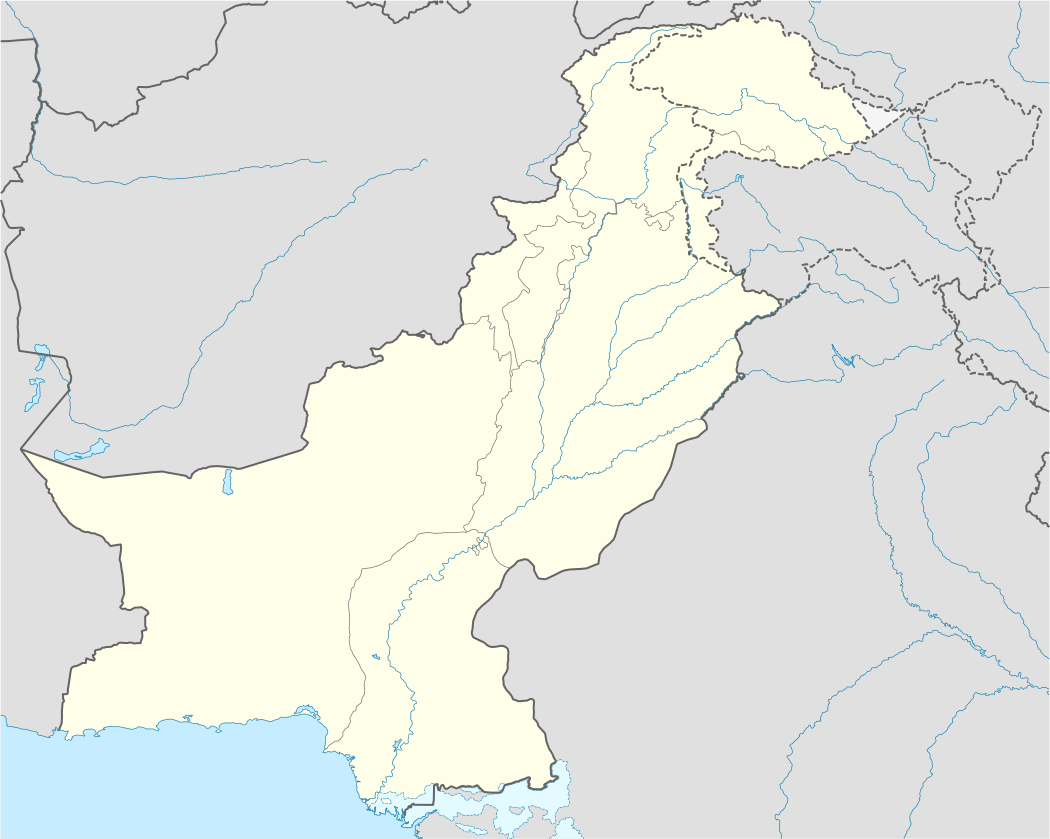Kahuta
| Kahuta | |
|---|---|
| Kahuta | |
 Kahuta | |
| Coordinates: 33°21′N 73°14′E / 33.35°N 73.23°E | |
| Country |
|
| Province | Punjab |
| Time zone | PST (UTC+5) |
| Calling code | 051 |
Kahuta (Urdu: کہوٹہ) is a census-designated city and tehsil in the Rawalpindi District of Punjab Province, Pakistan. The population of the Kahuta Tehsil is approximately 160,000 at the 2008 census. Kahuta is the home to the Kahuta Research Laboratories (KRL) which was founded to undertake the Kahuta Project as part of the atomic bomb project. Before the Kahuta Project, the site was occupied by retired officers of Pakistan Armed Forces and contained a small public community, including a private high school.
History
The Punjab region became predominantly Muslim due to missionary Sufi saints whose dargahs dot the landscape of Punjab region. The predominantly Muslim population supported Muslim League and Pakistan Movement. After the independence of Pakistan in 1947, Muslim refugees settled in the area. Kahuta was a small incorporated city until the 1970s when KRL was constructed by the Pakistan Army Corps of Engineers under Engineering officer Major-General Zahid Ali Akbar, Director of Project-706.[1] During the 1960s and 1970s, Kahuta was inhabited by retired officers of the Pakistan Armed Forces.[2]
In the 1970s, the Ministry of Defence was tasked by Prime Minister Zulfikar Ali Bhutto to search for a remote location for carrying out atomic and weapon-testing experiments for the integrated atomic bomb project in 1976.[1][3] The residents of Kahuta were paid handsomely and were re-located in populated cities of Pakistan.[2] The Uranium Coordination Board (UCB) headed by Ghulam Ishaq Khan financed the reconstruction of the site.[1] Major-General Zahid Ali Akbar and later completed the drawings, surveying and measured the area aerially.[1] Within the week, the whole site was acquired by the Ministry of Defence, and the army truckloads, heavy engineering vehicles arrived the next day to re-built the site.[3] All incoming materials and research equipment were labeled as common items and engineering tools to conceal the true nature of their purpose.[1] Scientists and engineers working and living in Kahuta were censored by the senior military officials.[3] Soon, the site was classified and abandoned for public with only few allowed to resides.[3] The Engineering Research Laboratories (now KRL) was established by Zulfikar Ali Bhutto as a research government national facility under the Ministry of Defence.Narh and Matore are very close to kahuta which are locally famous for its tourism. First weekly Newspaper named Kahuta-Times has been publishing By Raja Shahzad Ahmad since August 2009. A well recognized newspaper which is a true representative of natives and folks of Kahuta and its surroundings. The newspaper is consisted of four pages in Urdu. Sometimes special pages are added on special event.
Kahuta-Times
First weekly Newspaper named Kahuta-Times was published By Raja Shahzad Ahmad in 2009. A well recognized newspaper which is a true representative of Kahuta and its surroundings. The newspaper is consisted of four pages in Urdu. Sometimes special pages are added on special event.
Geography
Kahuta is situated in the Himalayan foothills in Rawalpindi District of Pakistan's Punjab Province, approximately 30 km southeast of Pakistan's capital, Islamabad. There are many picnic spots like Narar (Narh), Azad Pattan, Tlaitar and Beyore kotli sattian. The area is noted for its wildlife and hunting. Pahari-Potwari is spoken in this region.
Kahuta in science
Both nationally and internationally, Kahuta is famous for home to the Khan Research Laboratories, one of the largest government national research facility and laboratories. Since the 1970s, Kahuta hosted an apex scientific research where atomic experiments were performed under guidance and supervision of Dr. Abdul Qadeer Khan who served as the chief scientist. In 1984, Abdul Qadeer Khan and the scientists of the Kahuta Research Laboratories allegedly claimed to have conducted a putative nuclear cold-test of an atomic weapon, independently designed by KRL under codename Kahuta Test. However, the Pakistan Atomic Scientists Federation and the Government of Pakistan dismissed the claims made by KRL.
References
- 1 2 3 4 5 Khan, Doctor of Engineering and Doctor of Science (Metallurgical engineering), Abdul Qadeer (July 28, 2009). "Random thoughts: Bhutto, GIK and Kahuta". Dr. Abdul Qadeer Khan, former Director-General of Engineering Research Laboratories (KRL), and former top scientist of Pakistan. Dr. Abdul Qadeer Khan, NI. Retrieved 2011-08-29.
- 1 2 Khan, Doctor of Engineering and Doctor of Science, Abdul Qadeer (July 28, 2009). "Until Sun Rise:§Bhutto, GIK aur Kahuta". Dr. Abdul Qadeer Khan, former Director-General of Engineering Research Laboratories (KRL), and former top scientist of Pakistan. Dr. Abdul Qadeer Khan. Retrieved 2011-08-29.
- 1 2 3 4 Ispahani, MP., Farahnaz (April 4, 2011). "Remembering Zulfikar Ali Bhutto". Farahnaz Ispahani, Member of Parliament (MP) representing Pakistan People's Party (PPP), Presidential Spokeswoman and a member of the Standing Committee on Foreign Affairs, Information and Broadcasting and Youth Affairs, and the Human Rights Committee. Farahnaz Ispahani, MP and Presidential Spokeswoman for the President of Pakistan, published at Tribune Express (TEX). Retrieved 2011-08-29.
Coordinates: 33°35′0″N 73°23′0″E / 33.58333°N 73.38333°E
